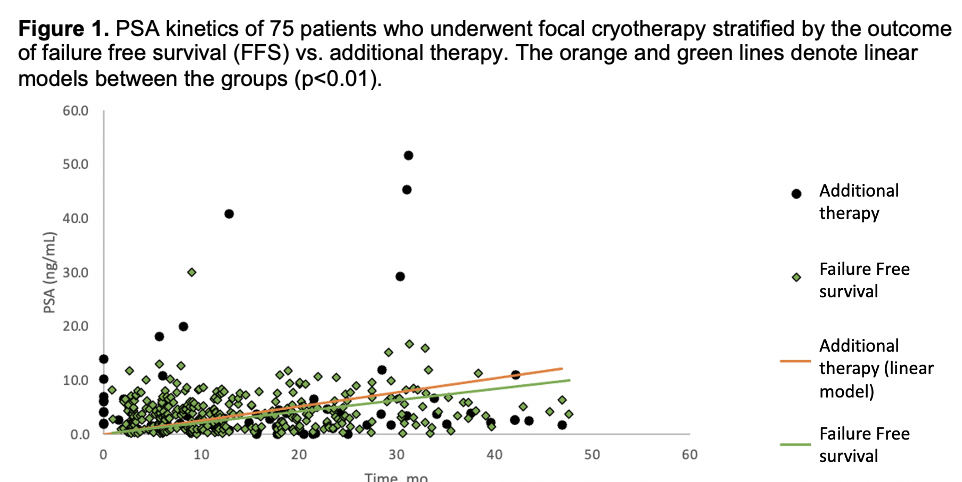Back
Poster, Podium & Video Sessions
Moderated Poster
MP55: Prostate Cancer: Localized: Ablative Therapy
MP55-19: MRI alone is not an appropriate surveillance mechanism for patients after focal cryoablation for localized prostate cancer
Monday, May 16, 2022
8:45 AM – 10:00 AM
Location: Room 225
Avi Baskin*, Leslie Charondo, Ashwin Balakrishnan, Janet Cowan, Matthew Cooperberg, Peter Carroll, Hao Nguyen, Katsuto Shinohara, San Francisco, CA
- AB
Poster Presenter(s)
Introduction: Cryotherapy is an attractive option for localized prostate cancer, but there is a dearth of literature on both outcomes and surveillance after therapy.
Methods: We performed a retrospective analysis of patients undergoing cryotherapy at a single institution. Inclusion criteria are: clinically localized biopsy proven cancer that is clearly visible on MRI or ultrasound and no known cancer abutting the urethra. Gleason 3+3 cancer in the contralateral lobe is also accepted. The cryotherapy protocol targets the specific lesion only. The follow up protocol for all patients includes PSA testing every 3 months followed by an MRI and biopsy at 1 year. The primary outcome is failure free survival (FFS) defined as treatment (transition to radical, whole-gland or systemic therapy), metastasis, or death due to disease. Secondary outcomes include post cryotherapy changes in Gleason grade group (GG) and MRI findings.
Results: 95 patients underwent cryotherapy, of which 75 (78.9%) completed post cryotherapy biopsy with a median follow up of 1.89 [IQR 1.19-2.77] years. The mean (SD) age at diagnosis was 66.8 (7.64) years and of the 75 patients, 8 (10.7%) were cT3a prior to cryotherapy based on MRI. Overall FFS was 66 (88.0%) at a median of 22.7 months, and of those who did not meet the outcome, 3 had metastasis, 1 had a salvage prostatectomy and 5 underwent radiation. On the treated side of the prostate, 7 (9.5%) of patients had residual =GG2 disease compared to 7 (9.3%) patients on the untreated side. Preoperatively, 65 (86.7%) patients had PI-RADS 4-5 lesions while post operatively 6 (8.4%) patients had PI-RADS 4-5 lesions. Of all patients with residual disease =GG1 on post cryotherapy biopsy, 31 (83.7%) had MRI PI-RADS 1-3. Out of the 12 patients who had residual =GG2 disease at follow up biopsy (either on treated or untreated side of the prostate), 11 (91.7%) had PI-RADS 1-3. Over the long term follow up, PSA increased faster in the patients who did not meet the primary outcome of failure free survival (p < 0.01, Figure 1).
Conclusions: Focal cryotherapy is effective for treating focal lesions of prostate cancer, but patients need to be followed. MRI alone is not effective at ruling out residual disease in the post cryoablation setting. PSA rises faster in patients who do not remain on active surveillance.
Source of Funding: Goldberg-Benioff Program in Translational Cancer Biology in the UCSF Department of Urology

Methods: We performed a retrospective analysis of patients undergoing cryotherapy at a single institution. Inclusion criteria are: clinically localized biopsy proven cancer that is clearly visible on MRI or ultrasound and no known cancer abutting the urethra. Gleason 3+3 cancer in the contralateral lobe is also accepted. The cryotherapy protocol targets the specific lesion only. The follow up protocol for all patients includes PSA testing every 3 months followed by an MRI and biopsy at 1 year. The primary outcome is failure free survival (FFS) defined as treatment (transition to radical, whole-gland or systemic therapy), metastasis, or death due to disease. Secondary outcomes include post cryotherapy changes in Gleason grade group (GG) and MRI findings.
Results: 95 patients underwent cryotherapy, of which 75 (78.9%) completed post cryotherapy biopsy with a median follow up of 1.89 [IQR 1.19-2.77] years. The mean (SD) age at diagnosis was 66.8 (7.64) years and of the 75 patients, 8 (10.7%) were cT3a prior to cryotherapy based on MRI. Overall FFS was 66 (88.0%) at a median of 22.7 months, and of those who did not meet the outcome, 3 had metastasis, 1 had a salvage prostatectomy and 5 underwent radiation. On the treated side of the prostate, 7 (9.5%) of patients had residual =GG2 disease compared to 7 (9.3%) patients on the untreated side. Preoperatively, 65 (86.7%) patients had PI-RADS 4-5 lesions while post operatively 6 (8.4%) patients had PI-RADS 4-5 lesions. Of all patients with residual disease =GG1 on post cryotherapy biopsy, 31 (83.7%) had MRI PI-RADS 1-3. Out of the 12 patients who had residual =GG2 disease at follow up biopsy (either on treated or untreated side of the prostate), 11 (91.7%) had PI-RADS 1-3. Over the long term follow up, PSA increased faster in the patients who did not meet the primary outcome of failure free survival (p < 0.01, Figure 1).
Conclusions: Focal cryotherapy is effective for treating focal lesions of prostate cancer, but patients need to be followed. MRI alone is not effective at ruling out residual disease in the post cryoablation setting. PSA rises faster in patients who do not remain on active surveillance.
Source of Funding: Goldberg-Benioff Program in Translational Cancer Biology in the UCSF Department of Urology


.jpg)
.jpg)